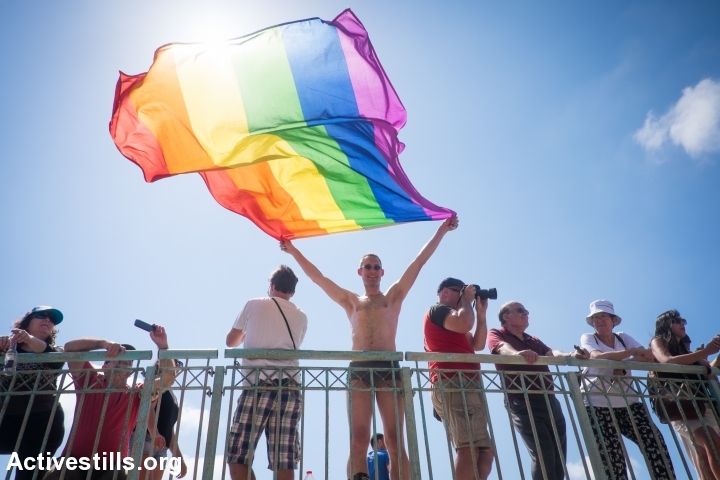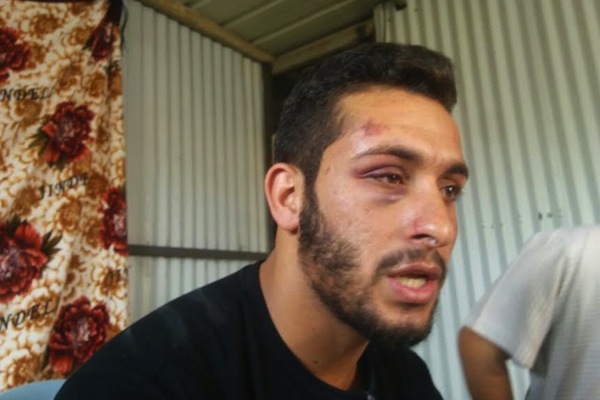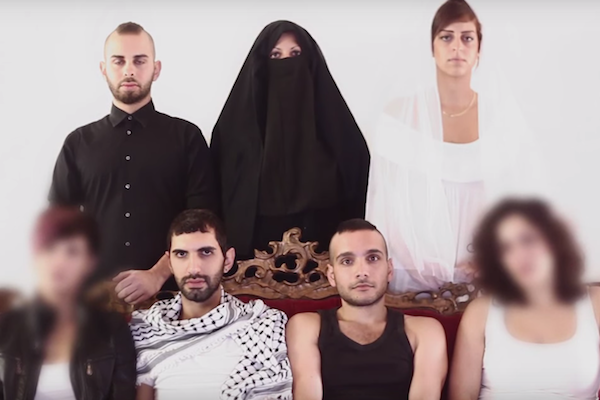Until the Israeli LGBTQ community truly begins caring about Palestinian oppression, Palestinian queers will have to keep checking our identity at the door.
Fady Khoury (translated by Tal Haran)

This past March I took part in a panel as part of Washington D.C.’s Independent Film Festival, where Jake Weisfeld’s new documentary, “Oriented,” was screened. The film, which was also screened this week as part of Tel Aviv’s LGBTQ film festival, TLVFest, tells the story of three gay Palestinian men living in Tel Aviv.
I assume that plenty has and will be said about the movie itself, but the point I wanted to focus on during the panel was the complete disregard by the creators from one of the central, recurring issues when it comes to LGBTQ rights in Israel: “pinkwashing,” namely the Israeli propaganda efforts to rebrand itself as a liberal democracy by focusing on LGBTQ rights in order to shift the international discussion away from the issue of occupation. One major theme in these propaganda efforts is branding Tel Aviv as a Gay Safe Haven.
I do not intend to write a film review of Oriented. I do, however, wish to deal with Friday’s pride parade in Tel Aviv vis-a-vis LGBTQ Palestinians. I also want to talk about the intersection of how Pride views Palestinians with major elements that simply do not exist in the film, which purports to present a “new generation of gay Palestinians” living in Tel Aviv, all while showing the complexities of the characters’ lives without seriously dealing with the wider political context in which Tel Aviv plays a central role.
Shelter for dogs, not for Gazans
Oriented was filmed over a period of three years, with some of the shooting taking place during the last attack on Gaza in 2014. In one of the scenes we see Khader Abu Seif, the protagonist, his partner David, and their dog Otis — who cannot stop crying — running to the stairwell of their building after an air raid siren sounds, in order to protect themselves from falling missiles. They sit while explosions are heard in the background, likely as a result of interceptions by Iron Dome. The scene is meant to be humane and evocative, in which the viewer feels empathy for Otis.
After the panel was over, we stepped off the stage and a few of the audience members approached us. Among them was a young woman who introduced herself as a Palestinian from Gaza. I asked her what she thought about the film. She responded, half-jokingly: “Apparently dogs in Israel are provided shelter, while in Gaza we had no way to escape the army’s bombs.” Her response turned into a recurring joke throughout the evening, when a group of Palestinians — including Khader — went out for dinner at an Ethiopian restaurant. Despite the jovial tone, the woman’s reaction made clear what the film had left out, and what Israeli Pride events conceal when it comes to the challenges facing Palestinians, including LGBTQ Palestinians.
The image of the queer Israel is often presented in political discourse as one-dimensional, usually summed up by their sexual or gender identity, while totally ignoring the intersection of other crucial identities. The Israeli mainstream expects the LGBTQ Palestinian to leave “Palestinian politics” aside when dealing with “LGBTQ politics.” The connection to Palestinians in the occupied territories becomes irrelevant, even irritating. Even the question of personal safety and freedom inside the Green Line, which is often sacrificed for the sake of national interests, takes a backseat to the interests of Israeli LGBTQ community and its struggles and is viewed as a separate issue.
Film review: ‘We’re Palestinian, we’re here and we’re queer’
In other words: among the LGBTQ community in Israel, the oppression of queer Palestinians as queer may be seen as relevant and a legitimate topic of discussion (although not necessarily, considering the community’s deafening silence following revelations that the Israeli army blackmails gay Palestinians in the occupied territories). Yet their oppression as Palestinians is seen as unrelated to the community’s broader political agenda in Israel.
The intersection of identities of LBGTQ Palestinian citizens of Israel functions as a formative piece in their daily reality, turning everyday apolitical events into ones that require difficult political choices: beginning with major issues such as the extent of one’s involvement in the community’s political agenda, events, struggles and institutions, through participation in its cultural life – seen as “non-political,” and the encounter with Jewish Israelis from various shades of the political spectrum at different dating websites.
LGBTQ Palestinian citizens of Israel are faced with the need to take sides in political dilemmas that turn all of these complexities into an indivisible whole. Any attempt to sort them out becomes artificial, thus preventing the proper safeguarding of rights for minorities who belong, by definition, to the various subgroups that make up the LGBTQ community.
Khader and the Border Police
The parade in Tel Aviv, like Oriented, brands Tel Aviv — whether directly or as a byproduct of partial presentation — as a safe, tolerant, and free city. Israeli propaganda groups (“hasbara”) abroad often speak explicitly of Tel Aviv’s uniqueness regarding the Palestinian LGBTQ community as well. But despite this narrative, issues that Israeli queers face in a safe and secure Tel Aviv never resemble those of Palestinians, queer or otherwise, for whom Tel Aviv is far less safe and secure.
Maysam Abu Alqiyan, for example, was a Palestinian in Tel Aviv. One could write volumes about his personal security in face of institutional humiliation and harassment. His story, however, does not concern the LGBTQ community. Another more relevant example may be found in an incident involving Khader himself in Tel Aviv.

In January of this year, Khader published a viral Facebook status in which he described the humiliation of being asked to undress by two Border Policemen in the middle of Tel Aviv (the policemen suspected him because his laptop bag was too large.) Two months later, Khader shared another humiliating incident involving airport security at Ben Gurion Airport. Luckily for him, he is a relatively well-known figure and his stories make waves in the Israeli media. But these such stories happen all the time, even in the heart of Tel Aviv, Israel’s self-proclaimed gay paradise.
The Tel Aviv Pride Parade and Oriented have one thing in common: the issue of personal security and the defense of Palestinians’ rights, and those of Palestinian LGBTQs in particular, are not viewed as relevant. And this without even getting into the question of the state’s treatment of Palestinian LGBTQs living under occupation – the very same state against which the Israeli LGBTQ community is struggling to obtain its rights.
As much as the parade purports to make a powerful political statement vis-a-vis the state on the right of LGBTQ Israelis to personal safety and freedom from persecution, in the effort to separate the persecution of queer Palestinians for being queer from their persecution as Palestinians lies a troubling dissonance. The message is clear: “March safely as LGBTQs, look carefully over your shoulder as Palestinians.”
Fady Khoury is a doctoral student at Harvard Law School. “Oriented” will be screened in Tel Aviv at the LGBTQ Film Festival, and is now available for purchase on iTunes. This article was first published in Hebrew on Local Call. Read it here.


